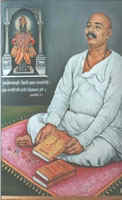Tukdoji Maharaj
Tukdoji Maharaj was a noble self realised saint. His early life was full of Sadhana both spiritual and yogic exercises. He spent much of his early life in the deep jungles of Ramtek, Salburdi, Ramdhighi and Gondoda.
Even though he was formally not much educated, his metaphysical spirit and potentiality was of very high order. His devotional songs permeates full spirit of devotion and moral values. His Khanjedi, a traditonal musical instruments was unique and his style of playing it, was unparalled. He was bachelor, however, his life was dedicated for the services of the masses irrespective of caste, class, creed or religion.
He was all the while absorbed in spiritual pursuits. He critically observed the nature of the people and channelised them for the cause of their upliftment. He had self realised vision and through out his life, taught the lessons for the purity of hearts and malice for none.
In early life, he used to sing the devotional songs, however, with the passage of time, he impressed the masses that God is not only in Temples, Churches or Masjids, he is everywhere. His powers have no limits. He advised his followers to follow the path of self realisation. He firmly opposed the priesthood and propagated the eternal values and universal truth.
Tukdoji stressed much on the congregational prayer wherein all the people irrespective of their religion, could participate. His prayer system is really unique and matchless in the world. He claimed that his congregational prayer system could be bound to bind the masses in the chain of brotherhood and love.
Rashtrasant Tukdoji used to work in person with the villagers in road construction, village-sanitation and other activities. His writings both prose and poetry are full of devotion and the spirit of humanity. His nobility was of very high order. His selfless devotion and dedication are .bound to teach the lessons for the generations to come. Tukdoji is a shining star in the tradition of the saints of our great India.

